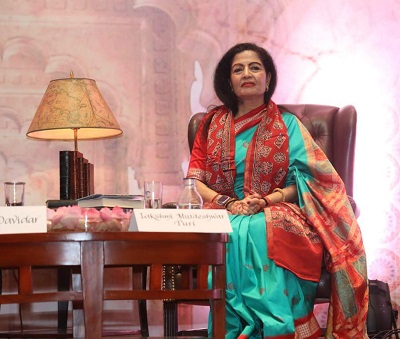New Delhi, (Asian independent) Lakshmi Murdeshwar Puri wears many hats — of a top diplomat, a gender rights advocate, wife of a Union Minister and daughter of a freedom fighter who grew up believing in revolution and the power of poetry.
But on Wednesday evening at a glitterati event presided over by veteran actor Kabir Bedi, Puri wore a different hat — that of a debutante novelist who has fictionalised her thoughts on revolution, freedom and change in ‘Swallowing The Sun’ (Aleph).
Releasing her debut novel ‘Swallowing The Sun’ (Aleph), Puri said she drew significantly from the lives of her parents and the upbringing she received in a close-knit Maharashtrian family.
Her father was a freedom fighter who, apart from instilling in her a strong belief in equality and freedom, indulged the family heavily with poetry.
Puri was away from India for 28 years, 15 of which were spent serving the United Nations, but she has always been longing to tell the story.
The journey of the novel began in Budapest, the Hungarian capital, where Puri served as India’s Ambassador. After 100 pages, however, as she said, Puri just gave up, maybe because the demands of the positions she held were just growing.
The seasoned diplomat retired from the United Nations as its assistant secretary-general after also serving as Executive Director, UN Women.
What led to the completion of the debut novel was the 2020 lockdown induced by Covid, which cut her off from the physical world. Her husband, Union Minister for Petroleum and Natural Gas and Housing and Urban Affairs, Hardeep Puri, also insisted that she should revisit the draft and finish it.
Hardeep Puri, incidentally, kept a low profile in the audience on Wednesday evening, letting the spotlight be on his wife.
On the small screen of an iPhone, Puri finished writing the first draft of her novel.
‘Swallowing the Sun’ examines some of the foundational beliefs of Indian society, such as freedom, equality, choice, marriage, togetherness, caste barriers, etc, most of which are expressed by drawing from Marathi poetry in some way or the other.
This “deeply human story”, as Kabir Bedi described it, is set against the backdrop of the freedom struggle.
The novel characters include, among others, a progressive father and his defiant daughter who fight caste barriers being placed in spaces such as schools, where girls were not allowed because what if it led to inter-caste marriages!
Quoting Mark Twain that “truth is stranger than fiction, mostly because fiction is obliged to be tied down by possibilities and truth is not”, Puri said that her parents’ lives were extraordinary because they transcended possibilities. But, as much as the novel is inspired by their lives, “it is also an act of creation”.
Bedi said it all when he noted: “This novel is an incredible tapestry of details shared with an authenticity that touched me. … People need to be reminded about what it took to get India free.”








